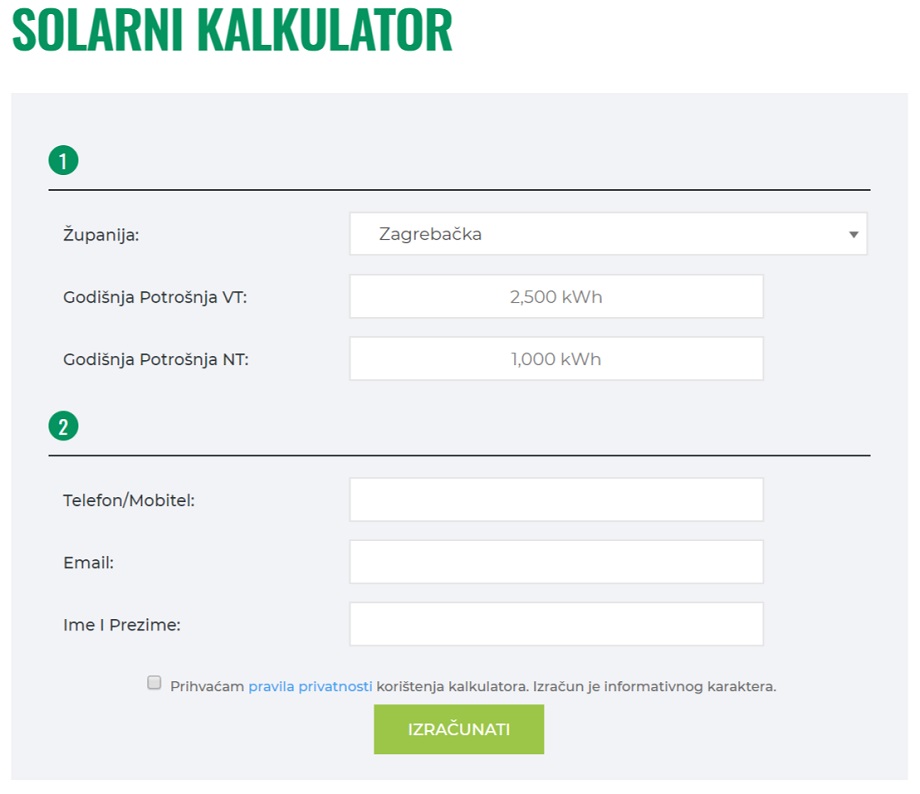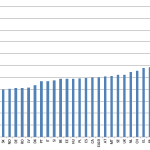Electricity from the sun: an initial investment of HRK 35,000 (4700 EUR) will pay for itself within six to eight years! The benefits of investing in a solar power plant on the roof of a single-family home in Croatia are up to 75 percent lowered electricity costs and will protect the buyer from rising market prices.
As Dubravko Grakalić/GlasIstre reports on November 19, 2019; alternative energy is becoming less and less of an alternative, and more commonplace for our households and small businesses. Croatia’s two largest electricity companies, HEP and RWE, have begun offering to install solar power plants on rooftops of single-family homes or businesses so that Croatian citizens and residents can generate electricity for their own needs. Interested households can easily arrange with their respective electric providers to become energy self-sufficient.
Simplified Procedure in Croatia
Due its geographical location and number of hours of sunshine a year, Croatia offers considerable potential for harnessing solar energy, experts say, and emphasize that less than one percent of all electricity is currently produced from photovoltaic systems. In early 2019, with the adoption of the Renewable Energy and High-Efficiency Cogeneration Act; self-supply electricity is now regulated by legal norms and the process has been greatly simplified. This legislation has paved the way for Croatian households to make the most of the sun’s energy for their own benefit and makes the use of solar power plants more accessible to everyone.
– The simplified procedure for issuing energy approvals enables citizens to become self-suppliers by having their own solar power plant installed, which will meet most of their electricity needs; even up to 75 percent. This offer applies primarily to households and small businesses within the tourism, hospitality and trade sectors, says Zoran Miliša, CEO of RWE Energija Croatia.
Setting up a solar power plant does not pollute the environment. And it produces electricity from sunlight, a renewable energy source, which is a safe and low-risk investment, according to the companies offering solar power plant installation to customers.
The benefit of investing in solar power plant on the roof of a single-family-home is up to 75 percent lower electricity costs and will protect the buyer from rising market prices. The repayment period is estimated at six to eight years. RWE Energija’s solar power plant installation offer includes a 25-year warranty and 10 years of insurance. Customers can expect to have their power plants installed within 90 days and the installation itself takes up to two business days.
The solar consultants at RWE Energija handle the necessary documentation and provide advice on choosing an optimal solution for every roof. And clearly there is an increase in the value of rental space for tourists who prefer environmentally friendly accommodations and are willing to pay a higher price for them, they say at RWE. They also offer solar calculator on their website so that prospective customers can see for themselves how much they will save with a solar power plant.

RWE Solar Calculator
After entering the real estate location and electricity consumption on an annual basis, the RWE solar calculator calculates the savings for every prospective customer. The calculator also accounts for the estimated power capacity of the power plant, the targeted amount of electricity, and the minimum roof area needed to install the solar panels. And it calculates the estimated repayment time. The minimum recommended annual consumption for the higher tariff is 2500 kWh. Then, the orientation of the roof, type of construction and the productivity of a solar power plant are assessed onsite. A perfect example is a family house on the coast with a north-south roof orientation. They calculate the available roof surface and consider that a power plant of 3 kWp requires about 18 square meters of roof. A 5 kWp power plant requires approximately 28 square meters of roof. The average power plant has a capacity of 3 kWp and is priced from HRK 35,000 (4700 EUR), which RWE Energija allows customers to repay over 36 installments.
Legalizing the power plant isn’t necessary since a mandatory part of the supporting documentation is proof that the building is legal (i.e. a building permit). As a solar power plant connects to a metered site, it is assumed that any building that has a meter is already legal, they explain at RWE energija. RWE will purchase any excess electricity produced by a solar power plant, but that is not currently a profitable venture for most home electricity producers.
HEP Upcoming Offer
HEP (Hrvatska elektroprivreda) will also offer two similar services to its customers very soon. HEP ESCO, a HEP company that offers various energy services, in collaboration with HEP Supply, will launch a HEPI Solar project designed for customers interested in erecting a solar power plant on their roof to cover their personal electricity consumption.
HEP will offer solar power plants from 4 to 10 kWp according to the ESCO model. This means that the company will independently finance the installation of such a power plant and maintain it for the ten years. The power plants will be paid for by the surplus electricity the plant produces, which will then be supplied to the grid. Signing three contracts is the only the legal prerequisite. The power plant will become the property of building owner after the contract period expires, HEP explained.
More information on the RWE solar plant offer and their solar calculator can be found here. Check out the HEP website regularly here for information on their upcoming solar plant offer.
For more information on clean energy in Croatia, follow our Lifestyle page.








